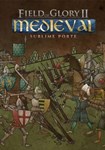DLC Field of Glory II: Medieval - Sublime Porte KEY🔑
Positive responses: 0
Negative responses: 0
Sold: 0
Refunds: 0
Seller: vokrugmira
information about the seller and its items
Loyalty discount! If the total amount of your purchases from the seller more than:
| $50 | the discount is | 2% |
| $100 | the discount is | 3% |
$4.96
💥Instant 24/7 product delivery immediately after purchase!💥 The product is delivered automatically even if we are offline.
❗️Please pay attention to the product specifications before purchasing❗️
🌟 (DLC) Field of Glory II: Medieval - Sublime Porte 🌟 This product is an addition to the game. To activate it, you need to have the main game.
Specifications:
Type: Activation Key
Activation region: RU+CIS+CN
Client for the game: Steam
Localization: Completely in English
Platform: PC
Year: 2022
---------
Description:
At the end of the XIII century, when the Rum sultanate of the Seljuks fell into final decline, Anatolia was divided into several small independent Turkish principalities called beyliks. One of these beyliks, bordering on the Orthodox Byzantine Empire, was headed by Osman I. The tiny Ottoman state gradually expanded over the next two hundred years and turned into one of the great empires of the world, known to descendants as the Ottoman Empire, after its first leader. At first, the Ottomans fought the Byzantines for control of the local Anatolian cities, but in 1354 they captured their first European territory by taking Gallipoli. This brought them into conflict with other Balkan Christian states, including Serbia, Bulgaria, Hungary, Wallachia, Moldova and Albania. Over the next fifty years, the Ottomans generally won these wars, as a result of which they became the dominant Balkan power. Their successes led to the Battle of Nicopolis in 1396, where the Western crusade was a disaster. In the east, most of Anatolia was recaptured from other Turkic beyliks. This success was briefly interrupted in 1402, when the Turco-Mongol conqueror Timur defeated the Ottomans in the Battle of Ankara. After the capture of Sultan Bayezid I, who died in captivity the following year, a chaotic civil war broke out in the empire between Bayezid´s sons, and order was restored only in 1413, when Mehmed I became sultan. The conquests resumed, and another crusade was defeated near Varna in 1444. Finally, the Turks conquered the great city of Constantinople in 1453, making it the capital of the Ottoman Empire. In the 15th century, a number of brilliant Balkan leaders challenged the Ottoman hegemony: John Hunyadi and his son, Matthias Corvinus from Hungary, the Albanian hero Skanderbeg, Stephen the Great from Moldavia and the Wallachian voivode Vlad "Impaler". However, despite the numerous victories of these people, by the end of the fifteenth century, the Ottomans were the dominant power in the eastern Mediterranean. Timur was born in 1336 into a noble family of the Turkic-Mongolian Barlas confederation in Transoxiana (on the territory of modern Uzbekistan). Having risen to control of Transoxiana by 1370, he created the Timurid empire in the territory of modern Central Asia, Afghanistan and Iran. Never defeated in battle, he won victories over the Golden Horde, the Delhi Sultanate, the Ottomans and the Mamluks, becoming the most powerful ruler in the Islamic world. His defeat by the Ottomans near Ankara in 1402 set back the Ottoman expansion by several decades. His empire collapsed shortly after his death in 1405, but his great-great-grandson Babur created the Mughal Empire in India, which lasted until 1857. The Catalan company was formed from Almugavar and other unemployed veterans of the Sicilian Vespers War in Sicily. In 1302, the company was hired by the Byzantine Emperor Andronikos II to fight the Anatolian Turkish bailiffs. Over the next two years, the company fought the Turks so successfully and treated Byzantine civilians so cruelly that the Byzantines became alarmed and treacherously killed the company´s executives. After that, the Company fought with the Byzantines and their allies, the Alan mercenaries in Thrace. In 1308, the Company moved to Greece, where in 1310 it entered the service of Gauthier V de Brienne, Duke of Athens, and quickly defeated his enemies. However, he did not
No feedback yet










